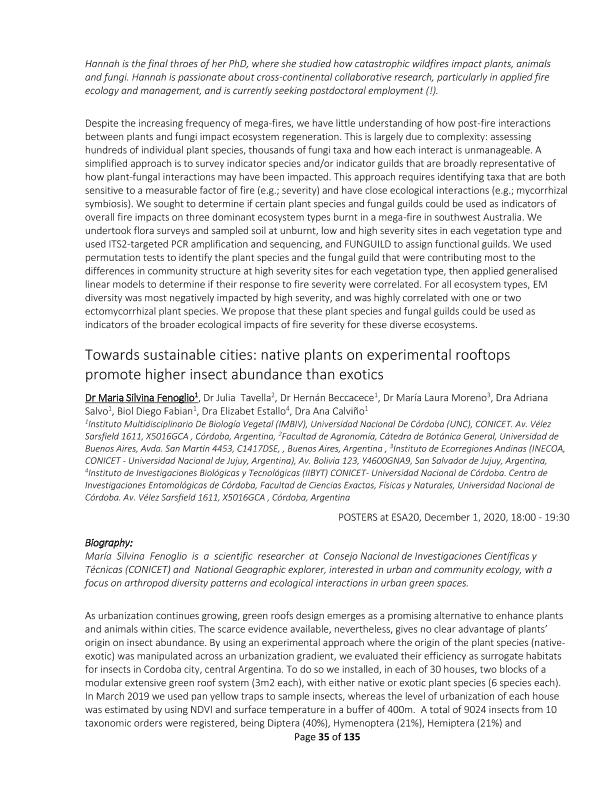Evento
Towards sustainable cities: native plants on experimental rooftops promote higher insect abundance than exotics
Fenoglio, Maria Silvina ; Tavella, Julia Rita
; Tavella, Julia Rita ; Beccacece, Hernán Mario
; Beccacece, Hernán Mario ; Moreno, Maria Laura
; Moreno, Maria Laura ; Salvo, Adriana; Fabian, Diego; Estallo, Elizabet; Calviño, Ana
; Salvo, Adriana; Fabian, Diego; Estallo, Elizabet; Calviño, Ana
 ; Tavella, Julia Rita
; Tavella, Julia Rita ; Beccacece, Hernán Mario
; Beccacece, Hernán Mario ; Moreno, Maria Laura
; Moreno, Maria Laura ; Salvo, Adriana; Fabian, Diego; Estallo, Elizabet; Calviño, Ana
; Salvo, Adriana; Fabian, Diego; Estallo, Elizabet; Calviño, Ana
Tipo del evento:
Congreso
Nombre del evento:
Ecological Society of Australia 2020 Conference: Understanding Ecological Extremes: Mechanisms of Resilience and Recovery
Fecha del evento:
30/11/2020
Institución Organizadora:
Ecological Society of Australia;
Título del Libro:
Ecological Society of Australia 2020 Conference
Editorial:
Ecological Society of Australia
Idioma:
Inglés
Clasificación temática:
Resumen
As urbanization continues growing, green roofs design emerges as a promising alternative to enhance plants and animals within cities. The scarce evidence available, nevertheless, gives no clear advantage of plants’ origin on insect abundance. By using an experimental approach where the origin of the plant species (native-exotic) was manipulated across an urbanization gradient, we evaluated their efficiency as surrogate habitats for insects in Cordoba city, central Argentina. To do so we installed, in each of 30 houses, two blocks of a modular extensive green roof system (3m2 each), with either native or exotic plant species (6 species each). In March 2019 we used pan yellow traps to sample insects, whereas the level of urbanization of each house was estimated by using NDVI and surface temperature in a buffer of 400m. A total of 9024 insects from 10 taxonomic orders were registered, being Diptera (40%), Hymenoptera (21%), Hemiptera (21%) and Thysanoptera (14%) the dominant groups. We found a significant effect (χ2 =11.58; p<0.0001) of the origin of plant species on total insect abundance, but non-effect of urbanization degree. Native plants sustained significantly more insects (median= 165,5; q1-q4=78.25-419) than exotics (median=115; q1-q4=78,25-312). This suggests that native plants on green roofs promote a higher abundance of insects than exotics probably due to the first share a greater evolutionary history with local fauna. On the way to achieve more sustainable, greener cities, our results highlight that the origin of vegetation should be taken into account in green roof design to better achieve urban insect conservation.
Palabras clave:
URBAN ECOLOGY
,
INSECT
,
EXOTIC PLANTS
,
NATIVE PLANTS
Archivos asociados
Licencia
Identificadores
Colecciones
Eventos(INECOA)
Eventos de INSTITUTO DE ECORREGIONES ANDINAS
Eventos de INSTITUTO DE ECORREGIONES ANDINAS
Citación
Towards sustainable cities: native plants on experimental rooftops promote higher insect abundance than exotics; Ecological Society of Australia 2020 Conference: Understanding Ecological Extremes: Mechanisms of Resilience and Recovery; Windsor; Australia; 2020; 35-36
Compartir



